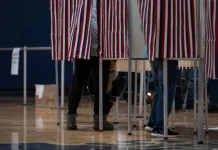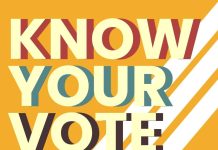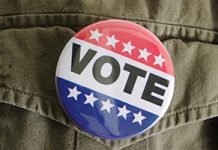By: NHPR Staff
The general election is Nov. 5. Here’s what you need to know to find your polling place, cast a ballot and more.
Quick links: Find your polling place | Look up a sample ballot | Check your voter registration status | Track your absentee ballot | Voting as a naturalized citizen | Voter registration rules | Voter ID rules | NHPR election coverage | Conversations with the Candidates
Voting information is also available from the New Hampshire Secretary of State in Spanish, French, Mandarin and Portuguese: Información Electoral |Information sur les élections |选举信息 | Informação Eleitoral
What are we voting for?
The election on Nov. 5 will decide which candidates represent New Hampshire voters in Congress, governor and other state- and county-level offices. Voters will also have the chance to choose which presidential candidate they want to lead the country for the next four years.
Does it matter what party I’m registered with?
Not for the general election. Any voter can vote for any candidate on the ballot, regardless of your party affiliation.
How can I check my party registration?
You can look it up on the Secretary of State’s website, or you can call your local clerk to ask for assistance. Every city and town is also required to have an up-to-date voter checklist posted publicly at city or town hall.
How do I vote?
You can vote in-person on Election Day or by absentee ballot, but you can only vote absentee if you meet certain requirements. (Scroll down for more details on absentee voting.)
If you plan to vote in-person on Election Day, you can find your local polling place here. For more information about your local polling hours or locations, visit the New Hampshire Secretary of State’s website, or contact your local clerk directly.
Before you can vote, you first need to make sure you’re registered at your local polling place.
If you’ve already registered and haven’t moved to a new address since then, you probably won’t have to re-register.
If you’re voting for the first time or living somewhere different than the last time you voted, you will likely have to register or make sure your voter information is up-to-date.
You can check your registration status on the Secretary of State’s website or with your local clerk.
In the final two weeks before the primary, many towns close off voter registration in order to finalize their voter lists for Election Day. Consult with your town or city clerk to see when that deadline is. If you miss it, remember: You can still register at the polls on Nov. 5.
Can I vote absentee?
Most New Hampshire voters cast a ballot in person on Election Day, but you can register to vote absentee if you have a state-approved excuse, including:
- You plan to be out of town on Election Day
- You have a religious observance or commitment
- You have a disability or illness that makes it difficult for you to vote in-personlink
- You’re not able to make it to the polls because of an “employment obligation,” which could include paid or unpaid work, as well as caregiving responsibilities
- You have an active protective order due to experiencing domestic violence or you are participating in the Attorney General’s address confidentiality program
- You’re incarcerated on misdemeanor charges or while awaiting trial
More details on New Hampshire’s absentee ballot rules are available here.
What if I want to vote absentee but I haven’t yet requested an absentee ballot? Is it too late?
No. The full details on absentee voting deadlines are available here.
If you have an approved excuse, you can apply for and complete your absentee ballot in-person at your local clerk’s office anytime before 5 p.m. on Nov. 4.
All local clerks are required to be open from 3 to 5 p.m. the day before an election to allow people to apply for absentee ballots in-person.
If you’re mailing your absentee ballot, you should move quickly. The Secretary of State’s office suggests mailing those ballots back no later than Oct. 28. The deadline for clerks to receive mail-in ballots is 5 p.m. on Election Day.
Additionally, according to the state’s election procedure manual: “If a voter, for example someone who planned to vote in person but was unexpectedly hospitalized on election day, requests delivery of an absentee ballot, the town or city clerk may deputize someone to take an absentee ballot with the application and affidavit envelope to the person.”
I already sent in an absentee ballot. How can I make sure it’s counted?
You can check the status of your absentee ballot on the Secretary of State’s website.
Who can vote in New Hampshire?
New Hampshire voters must meet four basic requirements to cast a ballot here.
Age: You must be at least 18 years old at the time of the election.
Citizenship: You must be a U.S. citizen.
Identity: You must be who you say you are when registering to vote.
Domicile/residence: You must live in New Hampshire and consider it your home for voting purposes. (Here’s more information on how the state views voter residency.)
Can college students vote in New Hampshire?
Yes. College students are allowed to vote in New Hampshire, even those who relocated from another state to attend school here, as long as they haven’t also voted in their home state during the same election.
There are no special voting restrictions that apply only to students.
Do I need to have a New Hampshire drivers license or car registration before I can vote here?
No. Those items can be used to prove your eligibility, but neither are required in order to cast a ballot in New Hampshire.
According to the New Hampshire Secretary of State, “No one can be denied the right to register to vote or vote for being out of compliance with the requirements of the motor vehicle code.”
Do I need to get a New Hampshire drivers license or car registration after I vote here?
Possibly. But it depends.
According to the state, registering to vote is a way of establishing your residency in New Hampshire.
“Once one establishes domicile/residence in New Hampshire, New Hampshire law requires that person to take certain actions,” according to the state. “Under the motor vehicle code, a person has 60 days upon establishing domicile/residence to obtain a New Hampshire driver’s license, if they drive here, and to register a vehicle, if they own a vehicle in the state.”
More guidance on voting and motor vehicle licensing is available here.
Can naturalized citizens vote in New Hampshire?
Yes. The Secretary of State’s office has more information about voting for new citizens here.
How do I prove citizenship when voting?
You can sign a form at the polls confirming that you are a U.S. citizen who is eligible to vote. (This is called a Qualified Voter Affidavit.)
Or you can provide a birth certificate, a U.S. passport, naturalization papers or another record confirming that you are a U.S. citizen who was born abroad.
Keep in mind that a Real ID is not considered proof of citizenship under New Hampshire voting laws.
Do I need to bring anything to the polls?
If you want to simplify your registration and voting experience as much as possible, the answer is yes.
But according to state election officials, no voter should be turned away from the polls because they lack the right documents.
If you need to register to vote for the first time — or update your registration — you’ll need to bring documents that prove you meet the age, citizenship, identity and domicile requirements outlined above.
If you’re already registered to vote, you’ll still be asked to present a valid photo ID before casting a ballot. If you don’t have a photo ID, you’ll need to sign what is called a “challenged voter affidavit.” That’s a legal form swearing that you are who you say you are. Click here for more details on the state’s voter ID law.
In some cases, you might be able to use one document — like a New Hampshire driver’s license with your current address — to prove several different eligibility requirements.
The New Hampshire Secretary of State’s office has also instructed pollworkers that electronic documents, not just printed copies, are acceptable.
What if I don’t have the right documents when I show up to vote?
If you believe you still meet the legal requirements to vote in New Hampshire, you can cast a ballot on Election Day if you sign a form confirming that you are who you say you are and you meet the qualifications to participate in New Hampshire elections.
If you’re registering at the polls as a first-time New Hampshire voter without proper ID, you’ll still be allowed to vote with something called an “Affidavit Ballot.” But you’ll also need to send proof of ID to the Secretary of State’s office within seven days, or your ballot will be pulled from the final count. Pollworkers will give you a postage paid return envelope that you can use to submit a copy of the needed document to the Secretary of State. More details are available here.
Can I vote if I have a criminal record?
If you have been convicted of a felony but have been released from prison, you are eligible to vote.
By law, all correctional facilities in New Hampshire are supposed to “provide [an] offender written notice that he or she may vote during the period of the suspension or parole” upon release from incarceration.
Additionally, “people confined in a penal institution in pretrial detention or as a result of a conviction for a misdemeanor retain the right to vote,” according to the state’s election procedure manual.
“Most people sentenced to County Corrections fall in this category,” the manual reads. “Their domicile for voting purposes is the town or city where they had their domicile immediately prior to being confined. Persons confined in a penal institution must vote by absentee ballot.”
I don’t have a fixed address. Can I still vote?
Yes. The state’s election rules are clear: “Both the New Hampshire and United States Constitutions establish that a homeless person has the same right to vote as a person who owns, leases, or rents a home.”
Even if you don’t have a permanent address, there are other ways to identify your domicile for voting purposes.
“The homeless applicant’s domicile may be the street, parking lot, or park/woodland where the person lives/sleeps more than any other place. If the person lives in a car, their domicile may be where they park/sleep in the car more than any other place,” the state election manual says. “The homeless applicant’s domicile may be the home of another where, more often than any other, the homeless person sleeps. The homeless applicant’s domicile can even be the park, area under a bridge, or spot in the woods where, more than any other place, the homeless person sleeps.”
It’s also important to note that, according to state election officials, you are still allowed to vote even if you are not allowed to be living in the location that you use as your voting domicile.
“An applicant who is living in a campground in violation of a local ordinance prohibiting use of the campground as a principal residence/domicile may nonetheless register to vote using that domicile,” the state election manual says.
I need to request accommodations due to illness or a disability. What are my options?
New Hampshire polling places are required to be accessible to all eligible voters. You can find more information about voting with disabilities here.
Each polling place offers voting equipment designed to let anyone cast a ballot privately and independently, even if they have vision loss or other conditions that might make traditional balloting challenging.
Voters who need assistance filling out their ballot can also ask someone to help, but that person is not supposed to influence the voter’s choice. For additional information, the Disability Rights Center-NH’s voting rights guide is a useful resource.
The Disability Rights Center-NH also says voters can contact them for assistance if they have trouble accessing their voting location or think their voting rights are being violated.
What if I still have more questions about voting, or what if I run into problems on Election Day?
You can send questions or complaints to the New Hampshire Attorney General’s Election Law Unit by phone (603-271-3658) or email (electionlaw@doj.nh.gov). The state also operates an Election Day Hotline (1-866-868-3703) to field complaints on primary day.
If you want to let us know about a voting problem for a potential news story, we also want to hear from you. You can email us at news@nhpr.org, but please keep in mind that this is only for reporting purposes. While we can try to investigate the situation for a possible news story, we are not able to act in any kind of enforcement capacity. If you are running into a serious problem at the polls, you should report it to state or federal authorities using the numbers above.
If you think we made a mistake in any of the information above, please email us at news@nhpr.org to let us know.
These articles are being shared by partners in the Granite State News Collaborative. For more information, visit collaborativenh.org.
























